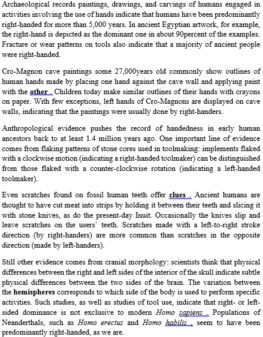Read the following passage and mark the letter A, B, C, or D on your answer sheet to indicate the correct answer to each of the questions from 28 to 35.
How is the news different from entertainment? Most people would answer that news is real but entertainment is fiction. However, if we think more carefully about the news, it becomes clear that the news is not always real. The news does not show us all the events of the day, but stories from a small number of chosen events. The creation of news stories is subject to specific constraints, much like the creation of works of fiction. There are many constraints, but three of the most important ones are: commercialism, story formulas, and sources.
Newspapers, radio, and TV stations are businesses, all of which are rivals for audiences and advertising revenue. The amount of time that the average TV station spends on news broadcasts has grown steadily over the last fifty years - largely because news is relatively cheap to produce, yet sells plenty of advertising. Some news broadcasts are themselves becoming advertisements. For example, during one week in 1996 when the American CBS network was airing a movie about the sinking of the Titanic, CBS news ran nine stories about that event (which had happened 84 years before). The ABC network is owned by Disney Studios, and frequently runs news stories about Mickey Mouse. Furthermore, the profit motive drives news organizations to pay more attention to stories likely to generate a large audience, and to shy away from stories that may be important but dull. This pressure to be entertaining has produced shorter, simpler stories: more focus on celebrities than people of substance, more focus on gossip than on news, and more focus on dramatic events than on nuanced issues.
As busy people under relentless pressure to produce, journalists cannot spend days agonizing over the best way to present stories. Instead, they depend upon certain story formulas, which they can reuse again and again. One example is known as the inverted pyramid. In this formula, the journalist puts the most important information at the beginning of the story, than adds the next most important, and so on. The inverted pyramid originates from the age of the telegraph, the idea being that if the line went dead halfway through the story, the journalist would know that the most crucial information had at least been relayed. Modern journalists still value the formula for a similar reason. Their editors will cut stories if they are too long. Another formula involves reducing a complicated story into a simple conflict. The best example is "horse race" election coverage. Thorough explication of the issues and the candidates' views is forbiddingly complex. Journalists therefore concentrate more on who is winning in the opinion polls, and whether the underdog can catch up in the numbers than on politicians' campaign goals.
Sources are another constraint on what journalists cover and how they cover it. The dominant sources for news are public information officers in businesses and government offices. The majority of such officers try to establish themselves as experts who are qualified to feed information to journalists. How do journalists know who is an expert? In general, they don't. They use sources not on the basis of actual expertise, but on the appearance of expertise and the willingness to share it. All the major news organizations use some of the same sources (many of them anonymous), so the same types of stories always receive attention. Over time, the journalists may even become close friends with their sources, and they stop searching for alternative points of view. The result tends to be narrow, homogenized coverage of the same kind.
The word "them" in paragraph 4 refers to _____.
A. journalists
B. organizations
C. experts
D. sources




Đáp án D
Từ “them” trong đoạn 4 để cập tới?
A. các nhà báo B. các tổ chức
C. các chuyên gia D. các nguồn
Căn cứ vào thông tin sau:
“All the major news organizations use some of the same sources (many of them anonymous), so the same types of stories always receive attention (Tất cả các tổ chức tin tức lớn sử dụng một số nguồn giống nhau (nhiều nguồn vô danh), vì vậy cùng một loại câu chuyện luôn được chú ý.)